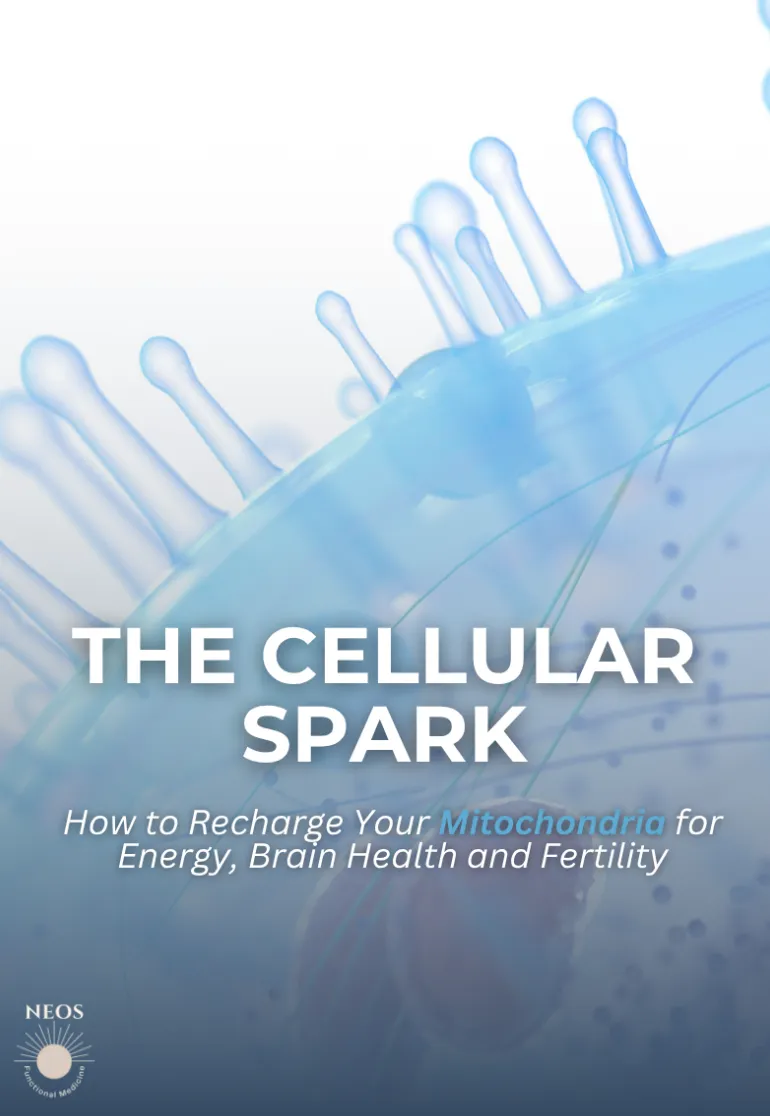
The CELLULAR Spark
You’ve probably heard that mitochondria are the “powerhouses of the cell” but what if I told you they’re also the gatekeepers of aging, fertility, and even cognitive function?
In recent years, a wave of scientific research has revealed something extraordinary: when we focus on supporting our mitochondria, we can literally change how we age, how our brains function, and how well our reproductive systems perform.
Let’s dive into the most exciting, evidence-based ways to restore mitochondrial health, through nutrients, lifestyle, and even surprising therapies like low-dose nicotine.
🔬 What Are Mitochondria—and Why Should You Care?

Mitochondria are microscopic organelles in nearly every cell in your body. Their main job? Producing energy (ATP) to power everything your body does—from thinking and breathing to hormone production and muscle contraction.
Here’s where it gets interesting:
Your brain, heart, and skeletal muscles contain some of the highest concentrations of mitochondria.
Ovarian cells and sperm are packed with mitochondria because reproduction requires enormous energy output.
As we age, mitochondrial function naturally declines, which has been linked to fatigue, cognitive decline, infertility, and even chronic illness.
📉 Mitochondrial Decline Over Time: What Happens as We Age?
After the age of 30, mitochondrial efficiency and number begin to gradually decrease. This decline is accelerated by:

But here’s the good news: mitochondria aren’t static. You can stimulate your body to grow new mitochondria and improve their function.
One of the key regulators of this process? A powerful molecule called PGC-1α.
⚙️ Meet PGC-1α: The Mitochondrial Master Switch
PGC-1α (Peroxisome proliferator-activated receptor gamma coactivator 1-alpha) is like the "CEO" of mitochondrial health. It regulates:
Mitochondrial biogenesis (growth of new mitochondria)
Energy metabolism
Antioxidant defense
You can activate PGC-1α naturally through:
Exercise (especially HIIT and strength training)
Cold exposure
Fasting
Certain nutrients (like Urolithin A and Nicotinamide Riboside)
🧬 Urolithin A: The Cellular Clean-Up Crew
One of the most exciting breakthroughs in mitochondrial health is Urolithin A, a postbiotic compound produced when gut bacteria metabolize ellagitannins (found in foods like pomegranates, berries, and walnuts).
Here’s what makes Urolithin A special:
It stimulates mitophagy, a process that removes damaged mitochondria—making room for healthy new ones.
Shown in clinical studies to improve muscle endurance and mitochondrial function in older adults.
Helps activate PGC-1α, supporting mitochondrial biogenesis.
👉 Pro tip: Not everyone produces Urolithin A efficiently through diet. Supplemental Urolithin A (like Mitopure®) ensures consistent cellular support.
🧠 Nicotine, Mitochondria & Brain Health: The Vanderbilt Revelation
Since 1986, researchers at Vanderbilt University have quietly been documenting the neuroprotective effects of low-dose nicotine—yes, nicotine—on the brain.
How does this relate to mitochondria?
Nicotine (in small, non-smoking doses such as patches or oral microdoses):
Activates nicotinic acetylcholine receptors, which in turn stimulates PGC-1α.
Supports mitochondrial function and density in neurons.
Has shown potential reversal of symptoms in Parkinson’s and Alzheimer’s disease models.
⚠️ Important: We’re not talking about cigarettes. Therapeutic nicotine must be used carefully, under clinical guidance, and is typically delivered in micro-dose patches or gums.
🏋️♀️ Exercise: Nature’s Mitochondrial Medicine
If there’s one thing you can do today to boost mitochondrial health, it’s move your body.
Exercise:


Best workouts for mitochondrial health:
💪 Even 20 minutes a day can start to shift your mitochondrial health in the right direction.
Where Mitochondria Matter Most
Let’s take a look at the body’s most mitochondria-dense tissues and why they matter for your health and longevity:
Tissue/ Organ
Why Mitochondria Are Critical

🌿 Top Supplements for Mitochondrial Health
Here’s a quick guide to mitochondrial-supporting nutrients to consider:

Fertility and Mitochondria: The Hidden Link
Both male and female fertility are intimately tied to mitochondrial health.
Women: Healthy mitochondria are essential for egg quality, ovulation, and early embryo development.
Men: Sperm motility and DNA integrity depend on efficient mitochondrial energy production.
Optimizing mitochondria can increase fertility success rates naturally, especially for those in their 30s and 40s.
Final Thoughts: It's Not Just About Energy—It's About Longevity
Mitochondria don’t just power your day—they power your future.
Whether you want:
More mental clarity
Better physical performance
Enhanced fertility
Protection from cognitive decline
…mitochondrial support is a foundational step.
By combining nutrients like Urolithin A, activating PGC-1α through exercise and strategic therapies, and staying aware of exciting research like low-dose nicotine for brain health, you can unlock new levels of vitality and prevention.
REFERENCES:
Ryu, D., Mouchiroud, L., Andreux, P. A., Katsyuba, E., Moullan, N., Nicolet-Dit-Félix, A. A., ... & Auwerx, J. (2016).
Urolithin A induces mitophagy and prolongs lifespan in C. elegans and increases muscle function in rodents.
Nature Medicine, 22(8), 879–888.
https://doi.org/10.1038/nm.4132Andreux, P. A., Blanco-Bose, W., Ryu, D., Burdet, F., Ibberson, M., Aebischer, P., ... & Auwerx, J. (2019).
The mitophagy activator urolithin A is safe and induces a molecular signature of improved mitochondrial and cellular health in humans.
Nature Metabolism, 1(6), 595–603.
https://doi.org/10.1038/s42255-019-0062-7Singh, R., De, S., Belkacemi, A., & Cui, J. (2022).
Urolithin A as a modulator of autophagy and mitophagy in neurodegeneration.
Pharmacological Research, 180, 106238.
https://doi.org/10.1016/j.phrs.2022.106238D’Amico, D., Sorrentino, V., & Auwerx, J. (2021).
Mitophagy: Emerging roles in health and disease.
Nature Reviews Molecular Cell Biology, 22(2), 75–93.
https://doi.org/10.1038/s41580-020-00313-8
(Includes discussion of Urolithin A in mitophagy context.)Xu, X., Zhang, Y., Zhang, X., Liu, Y., Wang, W., Li, Y., & Li, L. (2021).
Urolithin A alleviates cognitive deficits by enhancing mitophagy in Alzheimer’s disease models.
Neurotherapeutics, 18(2), 803–818.
https://doi.org/10.1007/s13311-020-00982-2Nunnari, J., & Suomalainen, A. (2012).
Mitochondria: In sickness and in health.
Cell, 148(6), 1145–1159.